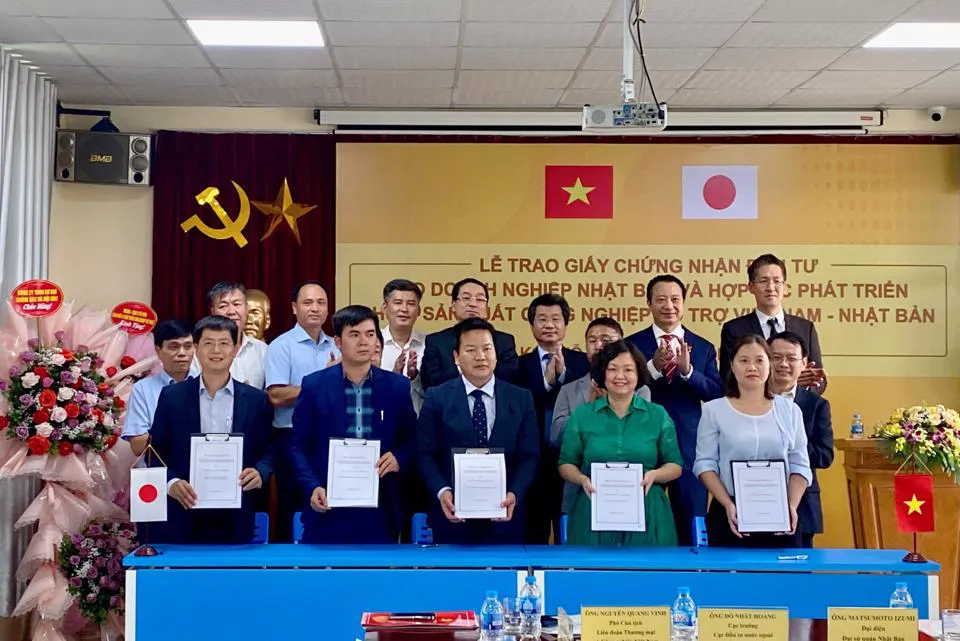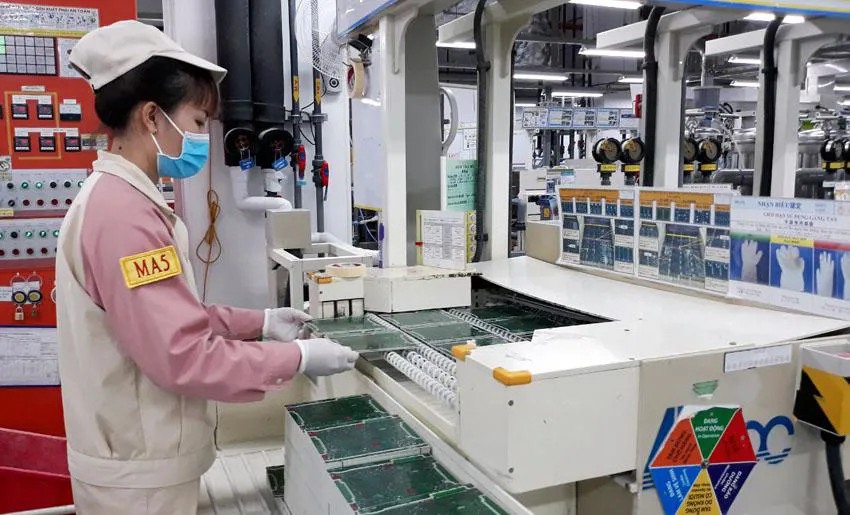Vietnam's electronics sector stands out as attractive destination for global investment shift
Vietnam currently stands 12th globally and third in ASEAN in electronics exports.
The Vietnamese electronics sector sees opportunities amid ongoing changes in global investment and restructuring of value chains, said Deputy Director General of the Industry Department under the Ministry of Industry and Trade Pham Tuan Anh at a conference on the prospects of a new investment capital wave into the local electronics sector on October 4.
| Issuance of investment licenses for Japanese companies participating in the Vietnam-Japan supporting industry production chains at the Hanoi Southern Supporting Industrial Park (HANSSIP). |
“Effective control of the pandemic situation and the return of socio-economic activities back to normal help Vietnam remain a safe and attractive investment destination, especially as companies around the world are promoting diversification in their supply chains,” Tuan Anh said.
In addition, Vietnam’s status on the international stage has been on the rise, thanks to its active efforts in global economic integration and the participation in a vast network of free trade agreements, he continued.
Tuan Anh also pointed out the constantly improved business environment, high-quality workforce, and a large domestic market of 100 million people as factors drawing the attention of foreign investors.
In this context, he suggested the electronics industry could be among the biggest beneficiaries, given the Government’s favorable legal environment and incentive policies for companies operating in this field.
According to Tuan Anh, the electronics sector has seen major improvements over the years, especially during the 2016-2020 period. With a 24% annual growth in electronics production over the five-year period, Vietnam ranked 12th globally from 47th in 2001 and third in ASEAN for electronics exports.
| Electronics production at Meiko Vietnam in Thach That Industrial Park, Hanoi. Photo: Le Nam |
“Vietnamese electronics companies have now been able to produce a majority of appliances, such as TVs, air conditioners, washing machines, smartphones, or printers, meeting domestic consumption and for exports,” he said.
The development of the sector is mainly thanks to large investment projects from multinationals, especially electronics corporations from South Korea, Japan, and Taiwan (China), Tuan Anh continued.
Last year, Vietnam’s exports of phones and accessories rose by 12.4% year on year to US$57.54 billion despite the severe Covid-19 impacts, while the turnover from computers and electronic parts hit $50.83 billion, up 14%. Of the total, export revenue of phones and parts to China posted a sharp increase of 23% to $15.18 billion, while shipments to the US rose by 10.3% to $9.69 billion, and the EU at $7.89 billion, down 9.1%.
The industrial production index of the electronics sector increased by 9.6% year on year in 2021 with the country churning out nearly 234 million smartphones, up 7.6%, and phone accessories worth VND408.8 trillion ($17.12 billion), up nearly 30%.
Climbing up the ladder in global value chains
Aside from the strong development progress, Tuan Anh from the MPI acknowledged major issues that are hindering the local electronics sector from further integrating into the global value chains, including low localization rate and the majority of products at a low-added value.
“To climb up the ladder and avoid being stuck in the low-added value activities in the global value chains, local businesses have to enhance competitiveness and form a strong ecosystem in the supporting industries, and become main suppliers for multinationals,” Tuan Anh continued.
Tuan Anh also stressed the necessity for Vietnam to have a strategic plan and groundbreaking policies for the development of the high-added-value electronics sector with a focus on both the hardware and software.
Sharing Tuan Anh’s view, Chairman of the Association of Foreign Invested Enterprises (VAFIE) Nguyen Mai called for the Government’s drastic measures in addressing bottlenecks facing both investors and companies.
“Incentives are necessary for FDI firms to form a linkage with their local partners, including the support for small and micro-sized companies in terms of finance, technology transfer, training, and corporate governance,” Mai said.
| “Samsung is currently the largest foreign investor in Vietnam with total investment capital of $17.7 billion during the 2006-2022 period, creating direct jobs for 110.000 people. Vietnamese first-tier vendors for Samsung rose from 4 in 2014 to 50 by late 2020, second-tier from 157 in 2018 to 200 in 2020, and the localization rate currently at 59%,” VAFIE Chairman Nguyen Mai said. |
Hanoi posted strong economic growth with an expansion rate of 9.69% during the nine-month period. This put the city in a favorable position to realize the GDP growth target of 7-7.5% for this year. |













